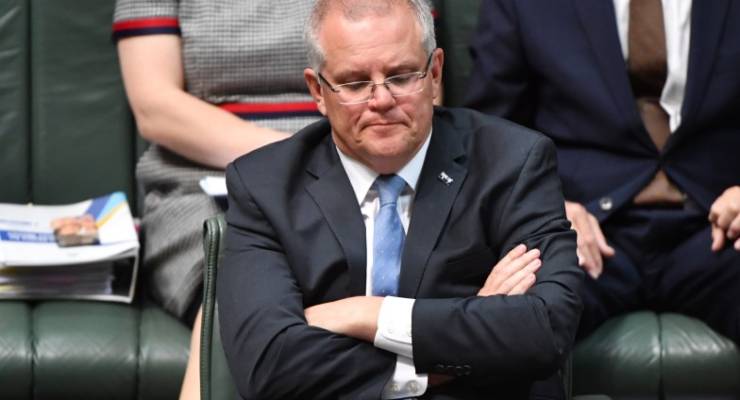
The contours of the culture wars were sharply in evidence last week in commentary on the government’s parliamentary defeat on asylum seekers — not just in terms of the issue’s moral dimensions, but also in its electoral impact.
For much of the Murdoch empire, the parliamentary vote and the government offensive that followed have amounted to a “Tampa moment” for Scott Morrison, who now finds a seemingly improbable election victory within his grasp.
The counterpoint was articulated by the ABC’s Barrie Cassidy, who contrasted the genuine sense of crisis that prevailed in 2001 and for much of the Rudd-Gillard period with the government’s current effort to will the issue back into prominence. Cassidy deemed that it was “too obviously just a scare campaign”.
Perhaps inevitably, the first national poll since the bill’s passage is being seen through this lens.
Conducted by Ipsos and published overnight by Nine newspapers, the poll finds Labor’s lead being slashed from 54-46 to 51-49 — which, The Australian proclaimed this morning, showed that Labor was being “badly punished” for its position on the bill.
For all anyone knows at present, this reading of the situation may be borne out in time, but for now there is good cause to be sceptical.
The field work period for the Ipsos poll began as the bill made its passage through the House of Representatives on Tuesday evening, and continued through to Friday. While that technically makes it the first poll since the bill was passed, any seasoned political strategist will tell you that all but the most high-impact events take several days to filter through the public consciousness.
Given the previous Ipsos result of 54-46 dates all the way back to December, there may well be other explanations, perhaps no less worrying for Labor, to explain the shift.
That’s if the shift is indeed real rather than apparent, for which Ipsos offers only scant evidence.
The widespread media coverage of the poll belies the scepticism with which much of the press gallery views the Ipsos series, which is given an airing on journalists’ Twitter accounts with seemingly each new result (with the inevitable exception of those from Nine newspapers).
The latest result typifies the pollster’s idiosyncrasies in recording the Greens on a thumping 13%, while both major parties come in below their primary votes from the 2016 election. Even if it were otherwise, it would remain the case that individual poll results should always be treated with caution. The theoretical error margin on this occasion is nearly 3%, which covers possibilities including a much smaller movement away from Labor, or even no movement at all.
As it happens, there was another, less widely publicised poll over the weekend that gave strong cause to doubt that anything particularly radical was going on in voterland while Ipsos was in the field.
Conducted by YouGov Galaxy for The Courier-Mail, the Queensland-only poll recorded a swing of 6% to federal Labor in the state the worst result for the Coalition out of eight such polls conducted since 2016.
It remains open to conservative optimists to argue that last week’s events changed the game by moving the agenda to terrain favourable to the Coalition, but for now this is a hypothesis backed by little real evidence.
Indeed, the recent record of polling raises doubts about its central premise — as shown in the chart below, Essential Research’s twice-yearly questions on which party respondents most trust to deal with various issues have found the Coalition’s advantage on asylum seeker policy steadily disappearing since it came to power in 2013.

The same pollster also recorded an even balance of opinion in October as to whether families and children on Nauru should be transferred to Australia, never mind any qualifications about medical treatment. This is a pattern familiar from the Howard era, when the government’s hard line on treatment of detainees lost its appeal as the boats stopped arriving.
The lessons of history suggest that only a substantial reactivation of boat arrivals, rather than the goings-on within what the Prime Minister likes to call the “Canberra bubble”, would be forceful enough to so transform the situation as to justify talk of a “Tampa moment”.








Crikey is committed to hosting lively discussions. Help us keep the conversation useful, interesting and welcoming. We aim to publish comments quickly in the interest of promoting robust conversation, but we’re a small team and we deploy filters to protect against legal risk. Occasionally your comment may be held up while we review, but we’re working as fast as we can to keep the conversation rolling.
The Crikey comment section is members-only content. Please subscribe to leave a comment.
The Crikey comment section is members-only content. Please login to leave a comment.